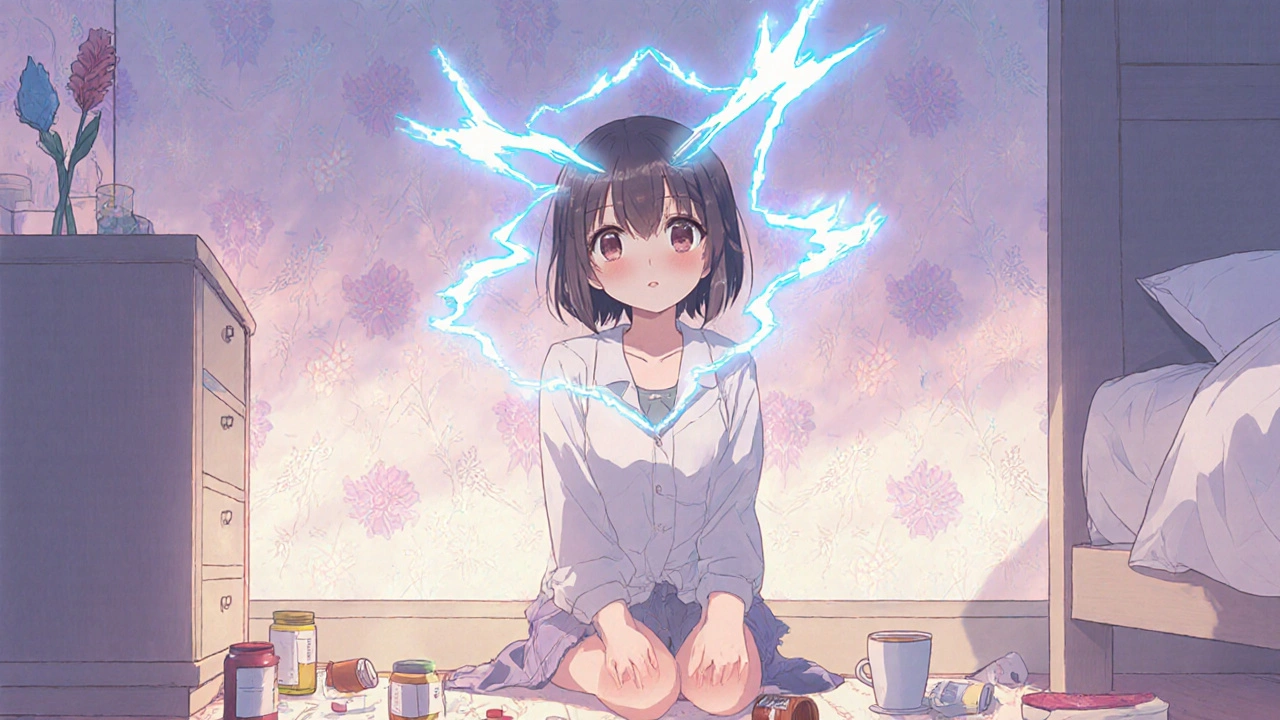
Antidepressant Tapering Calculator
Safe Tapering Calculator
Calculate a personalized taper schedule for your antidepressant. Always work with your doctor for medical guidance.
Stopping antidepressants isn’t as simple as just skipping a pill. Many people assume that because these medications aren’t addictive, they can be stopped anytime without consequences. But that’s not true. If you’ve been taking an antidepressant for more than a month and suddenly stop-or even cut the dose too fast-you could experience a set of physical and emotional symptoms called antidepressant discontinuation syndrome. It’s not a relapse of depression. It’s not anxiety returning. It’s your body reacting to the sudden absence of a drug it’s adapted to over weeks or months.
What Happens When You Stop Antidepressants?
Your brain doesn’t wake up one day and suddenly forget how to function without antidepressants. Over time, it adjusts. Serotonin, norepinephrine, and other neurotransmitters change their production and receptor sensitivity to match the presence of the drug. When you remove that drug too quickly, your brain is left out of balance. The result? A cascade of uncomfortable, sometimes frightening symptoms. These symptoms show up fast. For drugs with short half-lives-like paroxetine or venlafaxine-you might feel them within hours of missing a dose. For longer-acting ones like fluoxetine, it might take a few days. The most common pattern is captured by the medical mnemonic FIRST: Flu-like symptoms, Insomnia, Nausea, Imbalance, Sensory disturbances, and Hyperarousal.- Flu-like symptoms: Fatigue, muscle aches, chills, sweating, headaches, diarrhea. One study found 78% of people experienced fatigue after stopping.
- Insomnia: Trouble falling asleep, waking up too early, or having vivid, disturbing dreams. Around 65% of people report this.
- Nausea: Feeling sick to your stomach, sometimes vomiting. This affects nearly 60% of those discontinuing.
- Imbalance: Dizziness, vertigo, feeling off-balance, or unsteady on your feet. Some describe it like being on a boat.
- Sensory disturbances: The infamous "brain zaps"-sudden, brief electric shock-like feelings in the head, often triggered by eye movement. About 63% of people report this, especially with SSRIs.
- Hyperarousal: Anxiety, irritability, agitation, panic attacks, or feeling "on edge" without reason.
Some people also report strange sensations like "cotton wool in the head," derealization (feeling detached from reality), difficulty concentrating, or even sudden anger or suicidal thoughts. These aren’t signs of worsening depression-they’re signs your nervous system is recalibrating.
Not All Antidepressants Are the Same
The type of antidepressant you’re on makes a huge difference in how you’ll feel when stopping. It’s not just about the drug class-it’s about how long it stays in your body.- SSRIs like sertraline, escitalopram, and fluoxetine are common. Paroxetine has the shortest half-life (21 hours) and causes the worst withdrawal. Fluoxetine, with a half-life of 4-6 days, is much gentler to stop.
- SNRIs like venlafaxine and duloxetine are even trickier. Venlafaxine’s half-life is only 5-11 hours. Studies show nearly half of people on venlafaxine experience moderate to severe withdrawal symptoms.
- TCAs like amitriptyline can cause movement issues: tremors, stiff muscles, parkinsonian symptoms, and severe dizziness.
- MAOIs like phenelzine are the most dangerous to stop abruptly. They can trigger agitation, psychosis, catatonia, or myoclonus (involuntary muscle jerks). These cases need immediate medical attention.
And here’s something many doctors don’t tell you: switching from a brand-name drug to a generic version-even if it’s the same chemical-can trigger withdrawal. Why? Because different manufacturers use different fillers and release rates. A 2006 study found 22% of discontinuation cases happened during generic switches, not when patients stopped entirely.
How Long Do Symptoms Last?
Most medical guides say symptoms last 1-2 weeks. But real-world experience tells a different story. A 2023 survey from the Surviving Antidepressants community-over 15,000 active members-found that 73% had symptoms lasting longer than two weeks. Nearly 30% reported symptoms continuing for six months or more. One woman in Melbourne described her "brain zaps" lasting 9 months after stopping sertraline. Another said nausea didn’t go away until 18 weeks after tapering. The truth? While many people recover quickly, a significant number don’t. The National Institutes of Health admits symptoms can persist up to a year. Recent research in the Journal of Clinical Psychiatry found 18.7% of people on SSRIs had symptoms beyond three months. That’s not rare. It’s common enough to be expected.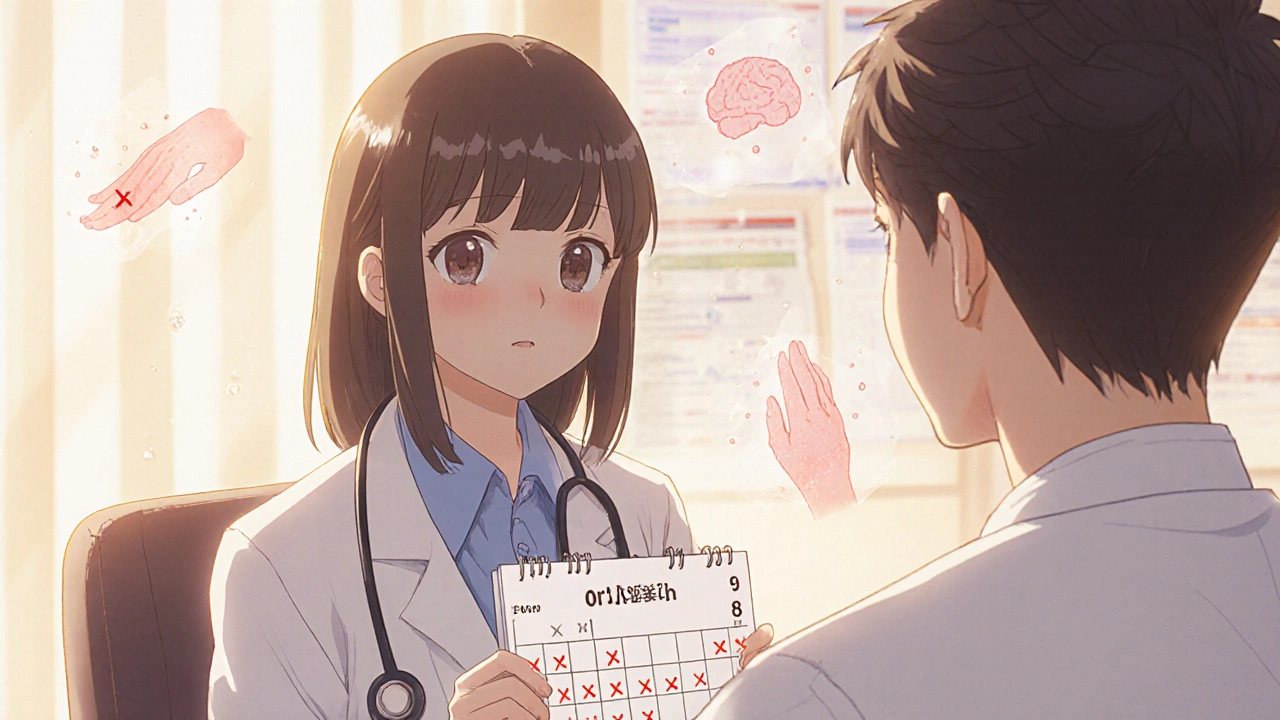
How to Avoid Discontinuation Syndrome
The best way to deal with withdrawal? Don’t let it happen in the first place.- Taper slowly. Don’t cut your dose in half overnight. For most SSRIs, a 6-8 week taper is recommended. For venlafaxine or SNRIs, go even slower-8-12 weeks. Some people need months.
- Use longer half-life drugs when possible. If you know you’ll want to stop later, ask your doctor about starting with fluoxetine. Its long half-life makes tapering easier.
- Never stop cold turkey. Abrupt cessation increases the risk of severe symptoms by more than three times.
- Don’t switch generics without supervision. If you’re switched to a new brand, tell your doctor you’re concerned about withdrawal. Monitor symptoms closely.
- Watch for high-risk moments. Pregnancy, stress, or life changes are common times people try to quit. Don’t do it alone. Talk to your prescriber.
There’s no one-size-fits-all taper. Some people need to drop 10% every two weeks. Others need to drop 5% every three weeks. Your doctor should help you build a personalized plan based on your medication, how long you’ve been on it, and your sensitivity to changes.
What If Symptoms Already Started?
If you’ve already stopped and are feeling awful, don’t panic. You’re not broken. You’re not crazy. You’re experiencing a known, documented reaction.- Go back to your original dose. Reintroducing the medication usually resolves symptoms within 72 hours. That’s how you know it’s withdrawal-not relapse.
- Don’t try to tough it out. If you’re dizzy, nauseous, or having brain zaps, don’t assume it’ll pass on its own. Contact your doctor immediately.
- Ask about temporary symptom relief. For nausea, ginger or antiemetics may help. For insomnia, melatonin or short-term sleep aids (under supervision) can help. For brain zaps, some find relief with low-dose fluoxetine-used temporarily to stabilize neurotransmitters.
- Don’t self-medicate. Alcohol, benzodiazepines, or cannabis might seem to help, but they can make things worse long-term.
One thing patients consistently say: the worst part isn’t the symptoms-it’s being dismissed. A 2022 Reddit thread with over 1,200 comments showed that 87% of people felt their doctors didn’t believe them. If your doctor says, "It’s just anxiety," or "You’re imagining it," ask for a second opinion. This is real. It’s measurable. And it’s treatable.

When to Seek Emergency Help
Most cases of discontinuation syndrome are uncomfortable but not dangerous. But some symptoms need urgent attention:- Severe confusion, hallucinations, or psychotic symptoms
- Extreme agitation or aggression
- Seizures
- Thoughts of self-harm or suicide
- High fever, rapid heartbeat, or muscle rigidity (signs of serotonin syndrome if you’ve recently restarted or changed meds)
If you’re on an MAOI and stop suddenly, these symptoms can be life-threatening. Go to the emergency room. Tell them you recently stopped an antidepressant. Don’t assume they’ll know what you mean.
Why This Isn’t Addiction
People often confuse withdrawal with addiction. It’s not the same thing. Addiction means you crave a drug for pleasure, lose control over use, and keep using despite harm. Antidepressants don’t cause euphoria or cravings. You don’t take them to get high. You take them to feel stable. Withdrawal is your body’s physical response to the absence of a substance it adapted to. It’s like stopping beta-blockers after months of use-you can get palpitations and high blood pressure. That’s not addiction. It’s physiology. The term "discontinuation syndrome" was coined by pharmaceutical companies to downplay the severity. Experts like Dr. David Healy argue it’s a classical withdrawal syndrome, not something minor. The language matters. Calling it "withdrawal" gives people permission to take it seriously.What Comes Next?
Research is catching up. Clinical trials are now looking at biomarkers to predict who’s at risk. Others are testing slow-taper protocols using liquid formulations for precise dosing. For now, the best advice is simple: don’t rush it. If you’re thinking about stopping, talk to your doctor. If you’ve already stopped and feel off, reach out. You’re not alone. Thousands have been here. And with the right support, most people recover fully-without lasting damage.Can antidepressant withdrawal cause long-term damage?
There’s no evidence that antidepressant withdrawal causes permanent brain damage. Most symptoms resolve completely with time or reintroduction of the medication. However, some people experience protracted symptoms lasting months or even over a year. These are not signs of injury-they’re signs the nervous system is still adjusting. Patience and medical support are key.
Why do I get brain zaps when I move my eyes?
Brain zaps are believed to be caused by sudden changes in serotonin levels affecting nerve signaling in the brainstem and visual pathways. Eye movement triggers a neural response that, in a sensitized system, feels like an electric shock. They’re harmless but unsettling. Slowing your taper or temporarily using a longer-acting SSRI like fluoxetine can reduce them.
Is it safe to stop antidepressants during pregnancy?
About 41% of pregnant women stop antidepressants without medical guidance, often out of fear. But abrupt cessation can trigger withdrawal symptoms that may affect both mother and baby. The safest approach is to work with a psychiatrist and OB-GYN to develop a slow taper plan, or sometimes continue a low-dose medication if benefits outweigh risks. Never stop cold turkey during pregnancy.
Can I switch to a different antidepressant instead of quitting?
Yes, but it must be done carefully. Switching antidepressants without a washout period can cause serotonin syndrome. The safest method is a cross-taper: slowly reduce the old drug while gradually increasing the new one. This reduces withdrawal risk and avoids dangerous interactions. Always do this under medical supervision.
How do I know if it’s withdrawal or my depression coming back?
Withdrawal symptoms appear quickly-within days of stopping-and improve within days of restarting the drug. Depression relapse takes weeks to develop and doesn’t improve immediately when you take the medication again. If your symptoms started right after missing a dose and you feel better after taking your pill, it’s likely withdrawal. If your low mood creeps back slowly over weeks, it’s likely relapse.

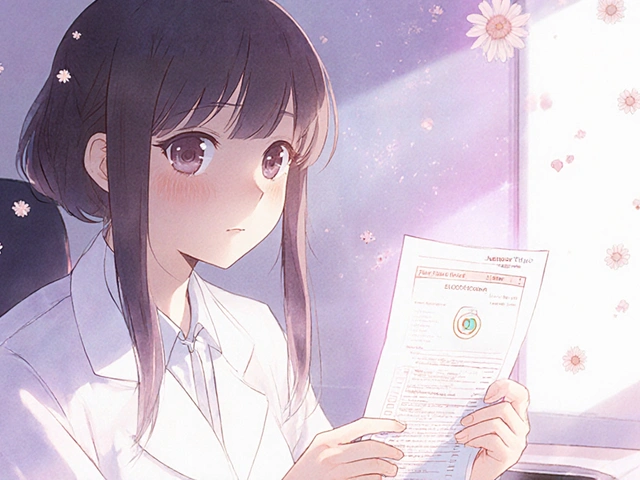
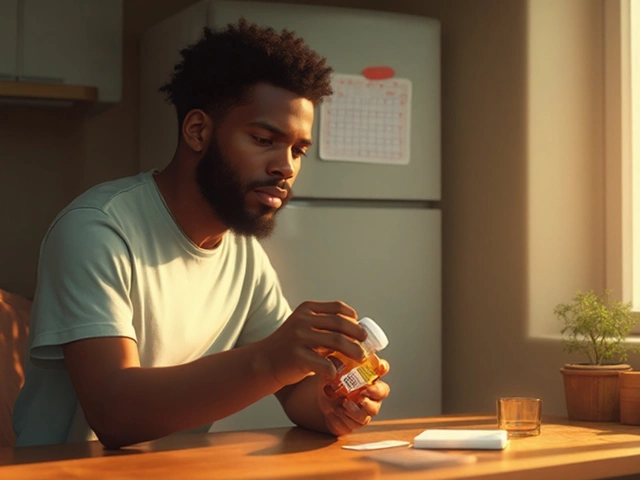

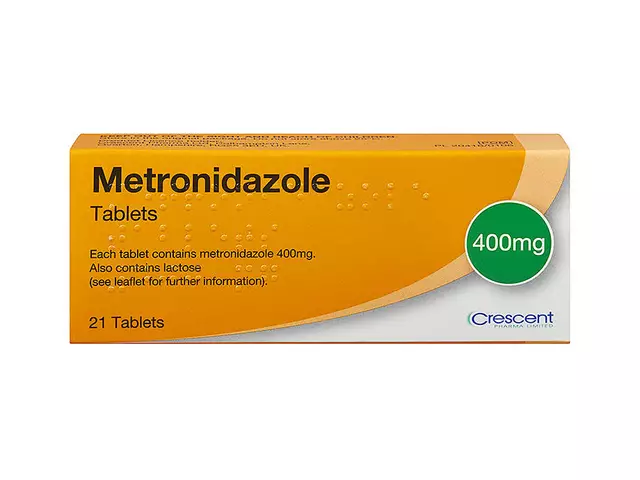
There are 8 Comments
Alyssa Torres
Okay but can we talk about how no one warns you about the brain zaps? I thought I was having a stroke when I first got them. Felt like someone was shooting tiny lightning bolts behind my eyes every time I looked left. Took me three weeks to realize it wasn’t my brain dying-it was just my serotonin panicking. My doctor acted like it was a myth until I showed him the Reddit thread. Now he actually listens.
Also, the "cotton wool" feeling? Real. Like my thoughts were wrapped in damp towels. I cried for three days straight because I couldn’t focus on a single sentence in a book. It’s not depression. It’s not anxiety. It’s your nervous system screaming for a slow goodbye.
Summer Joy
OMG I’m not crazy?? 😭 I thought I was losing my mind when I started crying during a commercial for laundry detergent. Like, why was I sobbing over socks?? My psychiatrist told me it was "adjustment disorder" and to "just breathe." BREATHE?? I couldn’t even walk to the fridge without feeling like I was on a tilting boat.
Also-generic switch? I switched from brand Zoloft to generic sertraline and thought I’d been possessed. Brain zaps, nausea, and a 48-hour panic attack. My pharmacy didn’t even tell me they switched it. I had to Google my symptoms and find this post. Y’all saved my life. 🙏
Aruna Urban Planner
The neurobiological mechanism underlying discontinuation syndrome is rooted in receptor downregulation and compensatory neurotransmitter dysregulation. Serotonergic and noradrenergic pathways, having undergone homeostatic adaptation during chronic SSRI/SNRI exposure, exhibit transient hypersensitivity upon ligand withdrawal. This manifests as a neurochemical rebound effect, particularly pronounced in agents with short half-lives due to rapid pharmacokinetic clearance.
Moreover, the heterogeneity in symptomatology reflects differential receptor subtype sensitivity across cortical and subcortical circuits. The prevalence of sensory disturbances, including brain zaps, correlates with altered GABAergic modulation in the brainstem reticular formation. Protracted symptoms, observed in 30% of cases, may indicate incomplete synaptic recalibration-a phenomenon under-researched in clinical trials due to short follow-up durations.
Nicole Ziegler
brain zaps are the worst 😩 I thought I was having mini seizures. then i started taking melatonin and it helped a bit. also ginger chews for nausea. and i stopped scrolling on my phone before bed. weirdly, that helped with the dizziness too. nobody talks about how tired you get. like, 12-hour naps and still exhausted. but it gets better. i’m 5 months out and now i just feel… normal. no zaps. no fog. just me. 🌱
Bharat Alasandi
bro i stopped venlafaxine cold turkey after 8 months and thought i was gonna die. dizziness, heart racing, nightmares so real i screamed. went back to my doc and he was like "eh, you’ll be fine." nope. i was in bed for 10 days. started tapering again at 10% every 10 days. took 4 months but now i’m clean and feel better than i have in years.
side note: if you’re switching meds, don’t just swap. cross-taper. ask for liquid form if you can. precision matters. and yes, generics can mess you up. my pharmacy switched me and i felt like i got hit by a truck. never again.
Kristi Bennardo
This article is dangerously misleading. The term "discontinuation syndrome" is a euphemism created by Big Pharma to avoid liability. What you’re describing is a classic, well-documented withdrawal syndrome. The fact that medical professionals routinely dismiss this as "not real" is a scandal.
Patients are being failed. We have data showing 18.7% of SSRI users experience symptoms beyond three months. Yet, the DSM-5 still doesn’t recognize it as a formal diagnosis. This isn’t about sensitivity-it’s about institutional negligence. If you stop beta-blockers and get palpitations, you’re not "just anxious." If you stop antidepressants and get brain zaps, you’re not "imagining it." You’re experiencing pharmacological dependence. Call it what it is: withdrawal. And demand better care.
Shiv Karan Singh
lol you all are overreacting. i stopped sertraline in 3 days and felt fine. everyone else is just weak. your brain should adapt. if you can’t handle a little dizziness, maybe you shouldn’t have taken the pill in the first place.
also, "brain zaps"? sounds like you’re watching too many sci-fi movies. and why are you all so obsessed with generics? they’re the same chemical. stop being paranoid. your doctor knows best. if you don’t trust them, stop seeing them. 🤷♂️
Ravi boy
my cousin stopped citalopram and got brain zaps for 6 months. she said it felt like her head was full of static. she didnt tell anyone cause she thought she was crazy. then she found this thread and cried for an hour. now she’s tapering slow with liquid. its been 3 months and zaps are gone.
ps: generics are not the same. the fillers change how it releases. my friend switched and got sick. pharmacy didnt say anything. dumb.
Write a comment
Your email address will not be published. Required fields are marked *